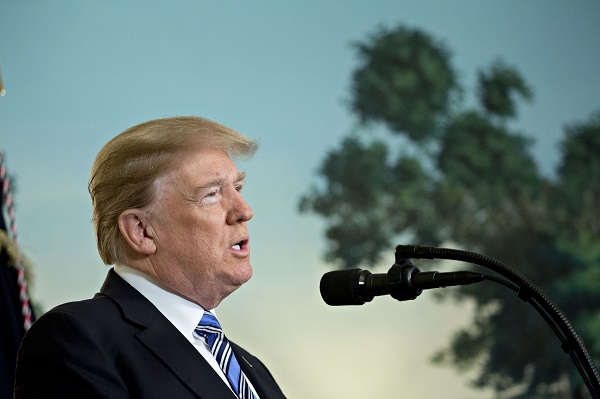 “With the action I am unveilingtoday, the United States will finally begin to confront one of themost unfair practices,” Trump said. (Photo: Bloomberg)
“With the action I am unveilingtoday, the United States will finally begin to confront one of themost unfair practices,” Trump said. (Photo: Bloomberg)
President Donald Trump's administration proposed cutting whatMedicare pays for many costly drugs for cancer and other conditions to matchlower prices paid by European countries, whose governments morestrictly control pharmaceutical costs.
|Trump said he wanted to stop “global freeloading” by othergovernments through the proposed change to Medicare. The programcovers more than 50 million elderly or disabled Americans and in 2015 paidfor about a third of the $325 billion the U.S. spent onpharmaceuticals, according to the Kaiser Family Foundation.
|Related: Reference-based pricing: a panacea for high drugprices?
|“With the action I am unveiling today, the United States willfinally begin to confront one of the most unfair practices,” Trumpsaid during a speech at the Department of Health and Human Servicesheadquarters in Washington. “I never understood: same company, samebox, same pill, made in the exact same location, and you go to somecountries it'll be 20 percent the price that we pay.”
|Medicare pays for drugs through two programs, Part B and Part D.Part D drugs are picked up at the pharmacy or through mail order,while Part B covers treatments administered by a doctor or in ahospital or clinic.
|For physician-administered drugs, Medicare pays for the cost ofthe product, plus 6 percent. Critics have said the system createsincentives for doctors to prescribe more expensive therapies, andfor drugmakers to raise prices.
|Under the proposal released Thursday, Medicare would makepayments for some drugs in Part B based on what would be known asan “International Pricing Index,” more closely matching what theU.S. government pays to rates paid in other countries, wheregovernment policy makers more closely control prices. TheDepartment of Health and Human Services said such a move would savethe government $17.2 billion over five years.
|Drug costs have become a major issue in the U.S., and Trump ishammering the topic less than two weeks before midtermcongressional elections. Democrats, who share many positions withthe president on drug pricing, are attempting to make gains incongressional seats.
|Trump has also made drug costs part of his focus on trade,saying that European countries have far lower prices and that U.S.consumers pays more as a result. A report released Thursday by theDepartment of Health and Human Services showed that Medicare, theU.S. health program for the elderly and disabled, pays almost twiceas much for certain drugs as other countries with similareconomies.
|“The government pays whatever price the drug companies setwithout any negotiation,” Trump said. “We are paying for, we aresubsidizing it, everyone else is benefiting.”
|Many of the countries Trump referred to also have health-caresystems that dictate prices or negotiate directly withpharmaceutical companies — the type of single-payer arrangementthat Trump and Republicans have repeatedly attacked.
|Drug shares stable
The Nasdaq Biotechnology Index, often used as barometer ofsentiment about drug prices, was up 2.1 percent at 2:24 p.m. in NewYork while the broader Nasdaq index was up 2.9 percent.
|Trump also said that the government would change the system bywhich doctors are paid under Medicare's Part B program, giving thema flat fee instead of a percentage.
|Prior attempts to reduce the reimbursement rate have failed inthe face of stiff opposition from industry groups, and despiteTrump's repeated attacks on the drug industry, Wall Street hasexpressed doubts about the impact many of his proposals will haveon the companies.
|“Our first impression on Trump's Part-B plan is that it is apolitical tactic ahead of mid-terms, with low probability ofmeaningful actual changes,” Alex Arfaei, an analyst with BMOCapital Markets said in a note to clients Thursday.
|The Biotechnology Innovation Organization, which representsmakers of biotechnology drugs, said the proposal would hurtinnovation as well as patients.
|“Adopting foreign price controls on American innovation putsAmerica's patients last and diminishes their hope for a betterfuture,” said BIO Chief Executive Officer James Greenwood.
|Read more:
- Pharma balks at proposal to list drug prices in TVads
- New HHS director blames PBMs, insurance plans forhigh drug prices
- Everything you need to know about two new drug costinformation bills
Copyright 2018 Bloomberg. All rightsreserved. This material may not be published, broadcast, rewritten,or redistributed.
Complete your profile to continue reading and get FREE access to BenefitsPRO, part of your ALM digital membership.
Your access to unlimited BenefitsPRO content isn’t changing.
Once you are an ALM digital member, you’ll receive:
- Critical BenefitsPRO information including cutting edge post-reform success strategies, access to educational webcasts and videos, resources from industry leaders, and informative Newsletters.
- Exclusive discounts on ALM, BenefitsPRO magazine and BenefitsPRO.com events
- Access to other award-winning ALM websites including ThinkAdvisor.com and Law.com
Already have an account? Sign In
© 2024 ALM Global, LLC, All Rights Reserved. Request academic re-use from www.copyright.com. All other uses, submit a request to [email protected]. For more information visit Asset & Logo Licensing.








